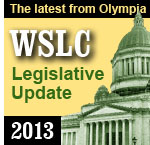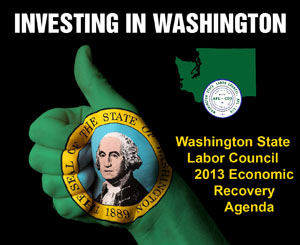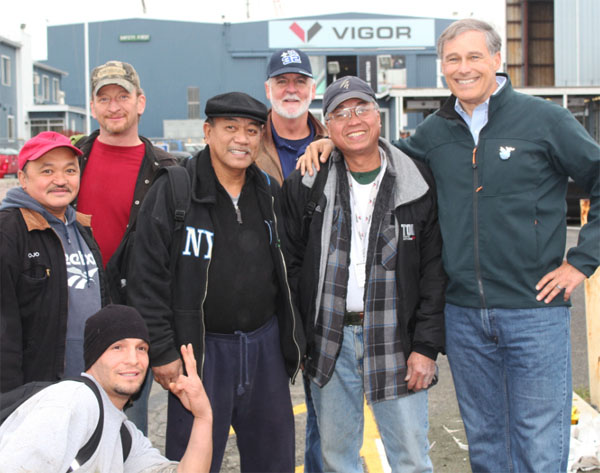STATE GOVERNMENT
Buy Washington: Create jobs here, including building ferries
 Following is an excerpt from today’s edition of the Washington State Labor Council’s weekly Legislative Update newsletter. It is posted here in its entirety and also in PDF format.
Following is an excerpt from today’s edition of the Washington State Labor Council’s weekly Legislative Update newsletter. It is posted here in its entirety and also in PDF format.
Our tax dollars should create jobs right here… including building ferries
OLYMPIA (Jan. 29, 2013) — If our state government needed to buy a passenger jet, would you rather it be built by Boeing or Airbus?
Before you answer, remember that governments, by and large, have to contract with the lowest bidder. If it was Airbus, would you have a problem with that? We would.
An important priority in the Washington State Labor Council’s 2013 Economic Recovery Agenda is to promote investment in our state’s businesses and workers by providing a preference for in-state goods and services in the government procurement process. In some cases it might be bid preferences of a certain percentage for in-state contractors with primarily in-state workforces. In other cases, as in the case of a passenger airplane or something of similar extraordinary cost, it might even mean passing a Build In Washington law that ensures Boeing gets the job. (And that it’s done here instead of in, say, South Carolina.)
Such a law has been on the books for more than 20 years regarding construction of new vessels for the Washington State Ferries. That law has been renewed several times in a bipartisan fashion, most recently in 2008 when the Gov. Chris Gregoire and the Legislature authorized the emergency replacement of the WSF’s Steel Electric-class boats due to hull erosion discovered the previous year.
That work went to Seattle-based Vigor Industrial, formerly Todd Pacific Shipyards, which will soon celebrate a century in business building ferries, barges and other vessels.
But now, some legislators are wondering if it would be a better idea to build cheaper ferries somewhere else.
Last week, the Joint Legislative Audit and Review Committee conducted a public hearing on a new audit of the state’s purchasing of new ferries. The audit concluded that the WSF’s recent vessel construction costs were higher than other systems’ costs, in part because of state laws requiring they be built in Washington and have state-certified apprenticeship programs, among other things.
We’ll get back to “among other things” in a moment.
The Build in Washington law passed because lawmakers of both parties recognized the importance of spending tax dollars here to create jobs here and to sustain an industry here. Those jobs have a multiplier effect on our state’s economy, creating more jobs and sustaining more businesses.
But these days in Olympia, too many austerity-minded legislators are being penny-wise and pound-foolish. It’s bad enough to ignore what used to be bipartisan common sense, but it’s worse when legislators publicly suggest in-state manufacturers can’t do the job right.
Last week on TVW’s Inside Olympia, making his case for “reform before revenue” for our state’s transportation system, House Minority Leader Richard DeBolt (R-Chehalis) said, “We can’t even build a ferry right without it sinking.”
Um, we’re not sure what he’s talking about, but we’re glad he wasn’t asked to comment on the 787 problems.
The WSF Steel Electric ferries retired in 2007 were 80 years old. Currently there are nine WSF boats between 40 and 65 years old. Our state’s standard ferry service life is 60 years, according to WSF officials, significantly higher than the 40-year ferry lifespan for other systems around the country.
In the case of WSF vessels, we not only get a superior product, we are creating and sustaining good jobs here. Plus we are promoting training to retain these family-wage jobs and to make sure our shipyards have a skilled workforce going into the future. That’s a win-win for taxpayers and our economy.
Are there changes that can be made to lower ferry construction costs? Absolutely. We could start with the audit’s findings that substantial design changes by the WSF increased the costs significantly. In fact, the audit states:
The largest cost difference we were able to identify (between the locally built Chetzamoka and the comparable Nantucket-built Island Home) was in the value of change orders between the two vessels… Of the $10 million in change orders issued by the WSF, about $6.5 million was spent to expedite the construction schedule and complete the vessel as quickly as possible.
Thanks to efficiencies gained after construction of the Chetzamoka, the audit found the in-state construction cost of the next boat in this class, the Kennewick, was “much lower… close to the amount the Island Home‘s construction shipyard told us it would cost them to build that ferry today.”
The higher ferry-construction costs have more to do with paying a premium for “rush jobs” than the Build in Washington and apprenticeship standards. We paid a premium price to expedite construction of the Steel Electric replacements. Why? Because our state is trying to run its transportation system on the cheap without investing in the infrastructure to maintain it.
Which brings us to…
A united push for transportation investment
 One of the smartest things lawmakers in Olympia could do to save the state money — and improve its business climate — over the long term is to invest in its crumbling infrastructure NOW rather than waiting for things to fall apart and paying a premium price.
One of the smartest things lawmakers in Olympia could do to save the state money — and improve its business climate — over the long term is to invest in its crumbling infrastructure NOW rather than waiting for things to fall apart and paying a premium price.
The labor, business and environmental communities are working together to encourage them to develop and approve a funding package this legislative session that will “make a significant down payment on the $50 billion need” in our state’s transportation system.
So wrote leaders from each of those constituencies in a letter delivered last week to Gov. Jay Inslee and legislative leaders. The letter was signed by Jeff Johnson, President of the Washington State Labor Council; Steve Mullin, President of the Washington Roundtable; Rob Johnson of Transportation Choices; Dave Myer of the Washington State Building and Construction Trades Council; and Brendon Cechovic of Washington Conservation Voters. Other business groups, including the Association of Washington Business and Associated General Contractors, support the effort but weren’t able to sign the letter.
Click here to read the rest of the Jan. 29, 2013 edition of the Washington State Labor Council’s weekly Legislative Update newsletter. It is also posted here in PDF format.






